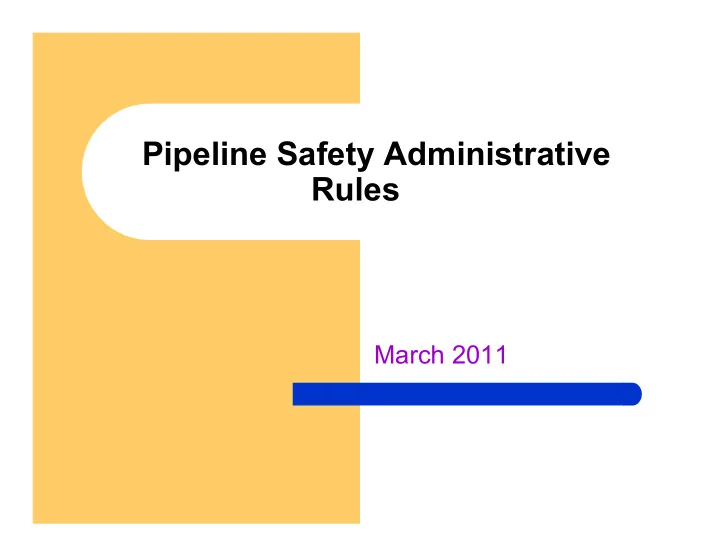

Pipeline Safety Administrative Rules March 2011
The South Dakota legal landscape SD STATUTES ADMINISTRATIVE RULES Created and changed 49-34A-4: The Commission • • through legislative action may write rules that pertain to: only design, installation, inspection, testing, construction, SD Pipeline Safety program • extension, operation, created by the legislature replacement and maintenance The statutes allow us to • of gas pipeline facilities make rules Recently drafted - 2009 • Intended to further specify • process by which to follow the statutes.
The Rule-making Process Anyone can open a rule making Rule Making Legislative docket Process Publish proposed rules • The process requires significant Written comments accepted • comment by all affected Live commission hearing • parties. Commission Order • Submission of rules to Rules • Please advise if any of our Committee rules do not work…or could Hearing with the Rules • be better. Committee
General principles If the rules don’t otherwise specify…… * follow federal code and/or state statute * follow PUC process…examples: docket process, filing rules, confidentiality issues What is the point? The Administrative rules simply add more red tape to keep track of! * to help define roles and obligations of all parties…including the inspector * to make the process transparent
General principles continued… What if the rules don’t help? * a PUC hearing is always available upon request. What is a “hearing?” * It can be as formal (lawyers, witnesses, experts, etc.) or as informal (a commission meeting) as you wish.
Routine Inspection - Report Inspection report drafted after each inspection – Operator shall complete an inspection report within 90 days – SHALL include summary of probable noncompliance issues (if any) � Notice of Probable violation � Warning � Notice of concern
Routine Inspection report continued…. – MAY include remediation plan if applicable (time frames if any may be extended by inspector) – Copy provided to the Operator – Not “docketed”---stays between you and your inspector
Non-compliance categories � Notice of Probable violation: if the inspector has good cause to believe a serious or repeat violation of applicable pipeline safety standards has occurred. – SHALL include a statement of te statute rule or regulation allegedly violated – SHALL describe the factual basis – SHALL state the amount of the proposed penalty (if any) – May be an “elevated warning” (a warning item not remedied in a timely fashion
Non-compliance continued… � Warning: probable violation of a less serious nature or a first time violation. – MAY include specific corrective action � Notice of concern: used to inform the operator where best industry practices are not being followed – No direct code violation – SHALL be used for information purposes only – NO PIPELINE OPERATOR ACTION IS REQUIRED
Routine Inspection – RESPONSE Pipeline Operator Response to Report (30 business days) If probable violations or warning exist • Admit the violation and comply with inspectors - recommendations Written dispute of any portion of the inspectors findings and - recommendation. Not docketed…stays between you and your inspector RESULTS Inspector report and/or recommendations amended OR a • Hearing….the Commissioners decide who is “right” •
INCIDENTS – Operator Notification Obligations – NOTIFY THE PUC BY PHONE - Earliest practical time – ALSO – federal reporting requirements
INCIDENT – Inspector Obligations – Open an incident docket. OPEN TO THE PUBLIC AND INTERVENERS ARE ALLOWED!! – Inspector investigation--- INTERVENERS ALLOWED TO “PARTICIPATE” – Requests for information – 10 day operator reply time – Disputes resolved by the commission – Incident report - docket closed when the Commission “approves” the report – Civil penalties possible
POST INCIDENT INVESTIGATION MEETING � BEFORE filing of a formal incident report � Inspector notify operator of completed investigation � Either party may request a meeting to discuss findings (meeting may take place prior to or after the filing of the report)
INCIDENTS – operator reply to inspector findings � 30 day reply period – Can be extended upon request – Failure to reply considered consent – 2 reply “options” REMEMBER: Either party may request hearing at any time in the process
Reply options OPTION 1: Agree with inspection report – If the results show no “fault” of operator….dismiss docket – If some “fault” attributed to operator � The inspector and the operator can settle---sent to the commission for approval � OR HEARING OPTION 2: Disagree with inspection report (assumes inspector found some “fault” attributable to operator) – Result = amended inspector report (inspector was wrong) OR – or hearing
Other Items � Change in ownership – Notification requirement (unless sale receives commission approval) � Written � Within 30 days of purchase or sale � Sent to pipeline safety program…not filed. � Line Construction – Notification requirement: construction, relocation or replacement of transmission line – 60 days prior
Other items continued… � Annual reports – Submit a copy of Form RSPA F7100.1-1 and/or Form RSPA F 7100.2-1 – Exception: petroleum gas system which serve fewer than 100 customers from a single source or master meter system
Recommend
More recommend